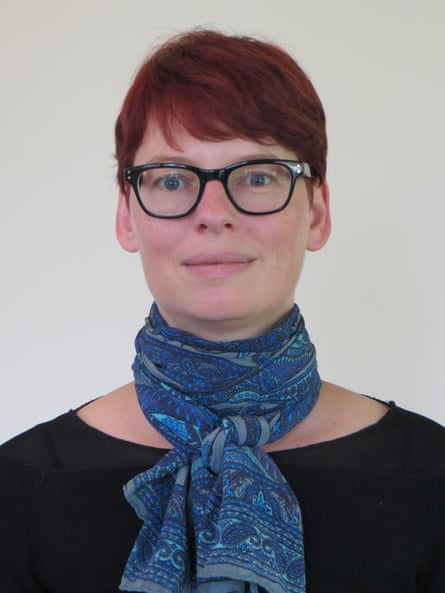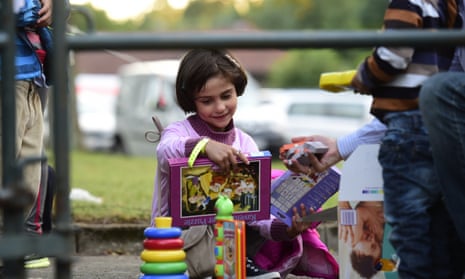We asked how you’ve been supporting refugees crossing into Europe. Among the efforts to help, you’ve been offering your spare rooms, making donations, and getting involved in sponsored events. Here a number of people across Europe tell us why they think learning the local language is one of the best ways to volunteer.
‘The whole idea of integration, mutual respect and understanding requires a language in which to communicate’
69-year-old retired teacher BJ is a Brit who’s been living in Sweden for almost 40 years. She was approached by asylum seekers at her local migration office who wanted her to help them learn Swedish.
“Until my retirement I taught German, French and English at the equivalent of sixth form level here in Sweden. I looked forward to my retirement but wanted some sort of useful social occupation, so I started going to the local migration office premises and was soon approached by newly-arrived asylum seekers asking if I could help them learn Swedish.
“Ludvika is a typically small town in central Sweden. What has happened is that increasing numbers of asylum seekers are sent here, often at very short notice, and the authorities have difficulty coping with them. The local authorities are obliged to provide schooling for the children and medical care to all. If and when the asylum seekers are granted residency, they are obliged to find housing and register at an address before they can start formal Swedish lessons. Some of the asylum seekers have been waiting for over a year in a remote camp. More recently large numbers of people from Syria have arrived, often highly educated, and keen to start a new life. They can feel disillusioned when they arrive here, the ‘land of hope and promise’, and realise that they may have to wait quite some time for their residence permits and even longer for accommodationand Swedish lessons.
“So a couple of friends and I agreed to meet some of them once a week for a couple of hours to teach them the basics, get them started. No organisation, nothing formal. We have been allowed to use various premises, including a room in the library. Some of our original group have moved on to other towns, some are still waiting to hear whether they will be allowed to stay. News of us is spread by word of mouth, some people turn up and disappear again, others are very regular attenders and have become a close-knit group. There are rarely more than about 15 of us, but we have recently decided to split into three different groups depending on their levels of proficiency.”
Many of the people BJ teaches come from Eritrea, Syria, Afghanistan, and Somalia. She finds the experience rewarding as it means being able to help practically with applications and future career prospects.
“It is essential for them to learn Swedish for various reasons. A medical doctor from Syria has considerable language hurdles to pass before he can practise as a doctor here. Further education, careers etc - all need Swedish. Most of the documents that are sent to asylum seekers by the authorities are still (surprisingly!) in Swedish only. The whole idea of integration, mutual respect and understanding requires a language in which to communicate.
“Why do I do it? I have increasingly realised that I do it not for altruistic reasons but because it makes me feel good! Some of our ‘pupils’ have made good progress with the language. It is rewarding to see that, to be able to help them with various practicalities, and most of all to see them respond to each other and to us in a relaxed and happy atmosphere for a couple of hours... I wish more people would realise how rewarding it is: no specific skills required, just a desire to help and a friendly smile.”

‘It’s important for them to be able to communicate beyond their own group, to move about independently, go shopping, get information, visit doctors and read’
Dr Otto Deutsch, a 71-year-old retired minister of the Lutheran Church in Saarbrücken, Germany, is just one of many helping with the crisis by teaching refugees languages.
“I have been teaching German since 2009 to migrant kids in the kindergarten that was part of my local church. The Saarland Ministry of the Interior, Culture and European Affairs had published a call for help in our regional newspaper and I wanted to volunteer in some way. Right now I have joined a network called Netzwerk Ankommen Saarbrücken (Network Arrival Saarbrücken) that runs German classes particularly for Syrian refugees. Its run by volunteers, but facilitated by the city of Saarbrücken.”
From studying in the US to teaching in Swaziland, Dr Otto feels Germany’s response to the crisis is a little belated, but that now they are on the right track.
“I think it’s important for Syrian kids to learn German as even if they stay for a limited period of time, it’s important for them to speak the language of the country. Or as much as possible be able to communicate beyond their own group, to move about independently, go shopping, get information, visit doctors, read, watch TV, you name it. Be part of it and not excluded! And all the more if they are going to stay indefinitely.
“Starting next week I’ll be taking care of three kids of a Syrian family (six, nine and 10) for two hours several times a week. All of them are in school already so I’ll be helping with their German and their homework. I look forward to it as it makes me feel good and needed to be able to help. The kindergarten kids I used to teach needed a certain period of warming to me. But after that they were quite eager. ”
‘I’d like to be a bridge between their old life and their new life, helping them transition because that’s integral for them in order to feel that this really is their country too now’
Living in Bochum, Germany, 41-year-old Bianca works for QVC Germany as a Customer Focus Specialist. She volunteered to teach after seeing the photos of three-year-old Aylan Kurdi.
“I’m not married yet and have no kids, so I have time to volunteer at hand! After pics of the little boy Aylan Kurdi swept the internet and the subsequent video of his father at the funeral was released, it was just tough for me watching all that. I felt so unbelievably helpless and angry and knew I wanted to do something, but had no idea what to do about it. In my desperation, I simply googled my hometown plus the words ‘refugee home’ into the search box and found the website of a local activist group who help a refugee home close by with donations. They also do voluntary work and they had a list of things they needed.

“The task I am volunteering for is called “Unterrichtspate” (tuition mentor) and is organised by a charitable organisation called IFAK (Society for Intercultural Child and Youth Services). They consist of people of all cultural backgrounds and their focus lies on assisting and helping refugee and migrant kids with their daily struggles, their school life and general help with integration and intercultural understanding. They organise play time for smaller kids and all kinds of activities for older kids. My task would be helping migrant and refugee children aged six and upwards who fall under compulsory education. This means they have to go to school (every weekday between 8am-2 pm) even though they may not be able to speak the German language yet.”
The use of a volunteers to help children during school is aimed at making things easier for children to both learn a new language and make new friends, said Bianca.
“A tuition mentor has a separate room next to the regular classroom, and migrant and refugee children who do not know the language yet would spend time there between 8am-12pm playing games, reading simple stories and getting help with becoming more accustomed with the local language. The number of children per mentor would be three to four kids.
“The reasons for these children to learn German are first and foremost simple pragmatic reasons in a school setting: they need to be able to follow the class. But my reason for wanting to help is that some of these kids haven’t been able to go to school in quite a while. All of them are new in this country and they most certainly feel alienated by the new culture and probably intimidated by everyone talking in a different language than them. My wish is to make them feel at home, first and foremost. I’d like to be a bridge between their old life and their new life, helping them transition because that’s integral for them in order to feel that this really is their country too now. I think that integration is key when it comes to migration.
“Volunteering with kids is not only about teaching them German. It also means to show them what this country is about. Yes, there will be challenges and yes, there will be trouble, but if you know the language, you will be able to communicate your worries and problems and the rest of us will be able to help you better. That’s what living in the same society and helping out one another means to me. I honestly can’t wait to start!”

Knowing that they can express themselves in even minor ways once they arrive will hopefully build their confidence, make them feel good about themselves and help them integrate better
Uta Sievers, a volunteer language teacher in Rome, wanted to help after realising that one of the things refugees travelling from Italy to Germany were missing was a few basic German phrases to help them when they arrived.
“I was inspired to do something after seeing the work that Centro Baobab do. Since the end of May, they have had 80 volunteers welcoming up to 800 people a day who are transiting through Rome on their way north to Germany. Travellers receive three meals a day, a welcome pack, and when they leave, after 2-3 days, a little rucksack with the basics for the trip onwards. The idea to add basic German lessons to that process came up spontaneously just a few weeks ago, and since then I have been putting together a concept. This situation is unique in that I’ll never have the same students between one week and the next, so I’ll repeat the same lesson over and over again. We are two volunteer teachers and ready to start any day now. At Centro Baobab, there have also been one-off Italian courses whereas elsewhere in Rome, regular courses in Italian and English (which I have taught in the past) are also available.
“For me, the few words that they will come away with (and the mini-dictionary we are preparing for them in collaboration with www.refugeephrasebook.de) will not just help them in plain practical terms. Knowing that they can express themselves in even minor ways once they arrive will hopefully build their confidence, make them feel good about themselves and help them integrate better into German society. They all look forward to reaching Germany, but at the same time they feel a little stuck while they are waiting to leave Rome, so teaching them German (or anything else, really) gives meaning to the time they spend here.”
Learning the language of their destination or the country that they find themselves in is good preparation for the future, said Uta.
“Volunteering in this way, I help them make sense of their time spent in Rome, and prepare them for their future. At the same time, I am also making sense of my presence as a German living and working in Rome. When I first thought of teaching German to those who didn’t want to stay in Italy anyway, to equip them for their future in my home country, I thought of it as something ‘subversive’, because at the time, the German government wasn’t too favourable of receiving large amounts of people either. Now of course, the situation is very different, and I feel I am actually helping my country (and my host country, Italy) - and it’s also my way of expressing the pride I feel right now about the new, welcoming attitude adopted by the German government.”
